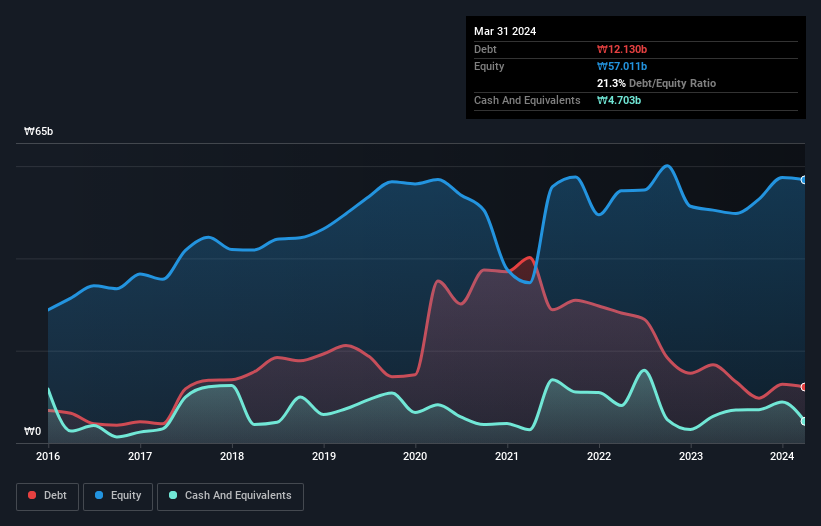- South Korea
- /
- Electronic Equipment and Components
- /
- KOSDAQ:A208710
Does Biolog Device (KOSDAQ:208710) Have A Healthy Balance Sheet?
Warren Buffett famously said, 'Volatility is far from synonymous with risk.' So it seems the smart money knows that debt - which is usually involved in bankruptcies - is a very important factor, when you assess how risky a company is. We note that Biolog Device Co., Ltd. (KOSDAQ:208710) does have debt on its balance sheet. But is this debt a concern to shareholders?
Why Does Debt Bring Risk?
Generally speaking, debt only becomes a real problem when a company can't easily pay it off, either by raising capital or with its own cash flow. If things get really bad, the lenders can take control of the business. However, a more common (but still painful) scenario is that it has to raise new equity capital at a low price, thus permanently diluting shareholders. Of course, plenty of companies use debt to fund growth, without any negative consequences. When we examine debt levels, we first consider both cash and debt levels, together.
Check out our latest analysis for Biolog Device
How Much Debt Does Biolog Device Carry?
The image below, which you can click on for greater detail, shows that Biolog Device had debt of ₩12.1b at the end of March 2024, a reduction from ₩16.9b over a year. On the flip side, it has ₩4.70b in cash leading to net debt of about ₩7.43b.

How Strong Is Biolog Device's Balance Sheet?
Zooming in on the latest balance sheet data, we can see that Biolog Device had liabilities of ₩40.6b due within 12 months and liabilities of ₩554.1m due beyond that. On the other hand, it had cash of ₩4.70b and ₩37.7b worth of receivables due within a year. So it actually has ₩1.29b more liquid assets than total liabilities.
This surplus suggests that Biolog Device has a conservative balance sheet, and could probably eliminate its debt without much difficulty. There's no doubt that we learn most about debt from the balance sheet. But it is Biolog Device's earnings that will influence how the balance sheet holds up in the future. So when considering debt, it's definitely worth looking at the earnings trend. Click here for an interactive snapshot.
Over 12 months, Biolog Device reported revenue of ₩143b, which is a gain of 37%, although it did not report any earnings before interest and tax. Shareholders probably have their fingers crossed that it can grow its way to profits.
Caveat Emptor
While we can certainly appreciate Biolog Device's revenue growth, its earnings before interest and tax (EBIT) loss is not ideal. Indeed, it lost ₩4.0b at the EBIT level. On a more positive note, the company does have liquid assets, so it has a bit of time to improve its operations before the debt becomes an acute problem. Still, we'd be more encouraged to study the business in depth if it already had some free cash flow. This one is a bit too risky for our liking. The balance sheet is clearly the area to focus on when you are analysing debt. But ultimately, every company can contain risks that exist outside of the balance sheet. We've identified 3 warning signs with Biolog Device (at least 1 which is concerning) , and understanding them should be part of your investment process.
If, after all that, you're more interested in a fast growing company with a rock-solid balance sheet, then check out our list of net cash growth stocks without delay.
New: Manage All Your Stock Portfolios in One Place
We've created the ultimate portfolio companion for stock investors, and it's free.
• Connect an unlimited number of Portfolios and see your total in one currency
• Be alerted to new Warning Signs or Risks via email or mobile
• Track the Fair Value of your stocks
Have feedback on this article? Concerned about the content? Get in touch with us directly. Alternatively, email editorial-team (at) simplywallst.com.
This article by Simply Wall St is general in nature. We provide commentary based on historical data and analyst forecasts only using an unbiased methodology and our articles are not intended to be financial advice. It does not constitute a recommendation to buy or sell any stock, and does not take account of your objectives, or your financial situation. We aim to bring you long-term focused analysis driven by fundamental data. Note that our analysis may not factor in the latest price-sensitive company announcements or qualitative material. Simply Wall St has no position in any stocks mentioned.
About KOSDAQ:A208710
Photon
Engages in the manufacture and sale of camera module parts for smart phones in China and internationally.
Flawless balance sheet and slightly overvalued.
Market Insights
Community Narratives



